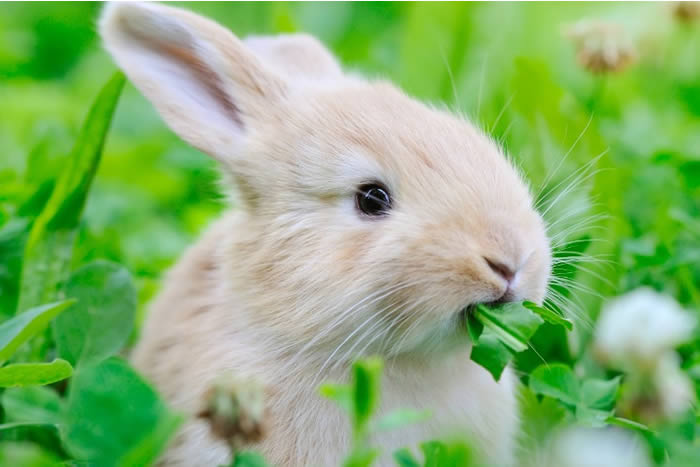How A Rabbit’s Digestion Works
Even if you’re a brand-new rabbit owner, you may have noticed that rabbits have very different dietary requirements than people. Being dedicated herbivores, all rabbits have a digestive system that is designed specifically for feeding on raw plants.
But do you know how rabbits accomplish this entirely raw diet? It’s mostly due to a complex system of gut flora. These bacteria have developed a beneficial mutual relationship with rabbits (source) that helps our fuzzy friends to digest otherwise tough and resistant plant matter.

While a rabbit’s digestive system is truly complex and extraordinary, it’s also extremely sensitive to things that humans have no problem eating. What’s more, the consequences of indigestion for a rabbit can be very serious, with gastrointestinal stasis being a common cause of trips to the vet.
Also Read Common ways to manage bacteria diseases in poultry
Because of this, it’s important to consider how anything you feed your rabbit is likely to affect their entire digestive system. This includes the nutritional value and effect on gut bacteria, and likelihood of producing gas. The best foods for rabbits are those that are easy to digest, high in beneficial nutrients, and without any significant gas producing properties.
What Do Rabbits Normally Eat?
According to the Veterinary Centers of America, Inc., a rabbit’s usual diet should consist of the following foods:
High-quality grass hay
Leafy green vegetables
Clean, freshwater
Keeping your rabbit healthy really can be as simple as following this list. Fresh hay should form the bulk of your rabbit’s diet, and always be available in abundance. The same goes for water:
Let’s look at a list of the most common foods that absolutely should NOT feed your rabbit:
11 Foods That are Dangerous for Rabbits
- Grains and Grain Products
This includes all breads, crackers, and cookies. Rice, wheat, oats, and more are not only too full of carbohydrates for your rabbit, but can cause dangerous digestive blocks, as well. That said, your rabbit will likely try to nibble on any sweets that you have; don’t let them.
Also Read Best Ways to Avoid Mortality in Brooding
- Beans
Raw or cooked, anyone who has eaten beans knows that they can cause indigestion and gas. While this is okay in humans, it can be fatal for rabbits. Peas are included in this, too because they’re in the same family as many beans, they can also cause gas or blockages that are harmful or fatal to your rabbit.
- Potatoes
Humans are unable to eat raw potatoes. And while rabbits may be able to digest these tubers in their raw state, that doesn’t mean that they should be eating them. In fact, a toxic compound called solanine makes green potatoes potentially deadly.
Even if a potato is entirely ripe and free of the green that indicates toxic solanine, its nutrient value makes it unsuitable for rabbits. Consisting almost solely of carbohydrates in the form of complex starches, potatoes can also lead to GI stasis via negatively impacting your rabbit’s gut bacteria.
- High Sugar Foods
Any food that is high in refined sugar, including all processed foods, should be entirely avoided in your rabbit’s diet. While bunnies have a natural sweet tooth, they can’t tell the difference between sugars that are okay for them (like fruits) and sugars that can ruin their gut health. Stay away from all cookies and candies for your rabbit’s diet, no matter how much they beg you for them.
- Cooked Foods
As herbivores, rabbits have evolved to be able to digest large quantities of raw plants. However, this adaptation has also made them sacrifice the digestive enzymes necessary for eating cooked foods. Therefore, if a rabbit eats cooked foods, it can lead to serious gastrointestinal distress by upsetting their delicate gut bacteria.
- Chocolate
Theobromine is one of the compounds in chocolate that makes it so satisfying and habit-forming for humans. However, rabbits do not have the necessary digestive enzymes to break theobromine down – making it a dangerously powerful stimulant to them. If your rabbit eats chocolate while you’re not looking, call your vet immediately.
- Nuts
Rabbits thrive on a diet that is high in fiber and carbohydrates, with a small amount of protein and very little fat. Because nuts are so fatty, they can easily disrupt your rabbit’s digestive system. If a blockage occurs because of this, it can be harmful or fatal to your rabbit’s health.
- Onions, Garlic, and Other Alliums
Any of the members of the pungent-smelling allium family can make your rabbit very sick if eaten; rabbits don’t have the digestive enzymes necessary to process them. Generally, you won’t have to worry about this one – rabbits hate the smell of garlic and onions and will gladly avoid them.
- Anything Caffeinated (Coffee, tea, etc.)
If you’ve ever drank too much coffee, you know that being overcaffeinated can be an unpleasant experience: Anxiety and an accelerated heart rate are common problems for the coffee addict.
While humans can handle this to some degree, rabbits are much more sensitive. The “buzz” from coffee or tea can increase their heart rate to harmful (or even fatal) levels, meaning that you should never feed your rabbit anything caffeinated.
- Avocados
This ever-popular guacamole ingredient is rich and fatty, making it completely unsuitable for a rabbit’s diet. Fat should comprise the smallest portion of any rabbit’s diet, so avoid feeding them things like avocados, oils, and nuts.
- Fruit Seeds
Apples and watermelons are the most common culprits of popular rabbit treats with toxic seeds. When giving your rabbit fruit as a treat be sure to chop up and thoroughly inspect it, carefully removing all seeds.


